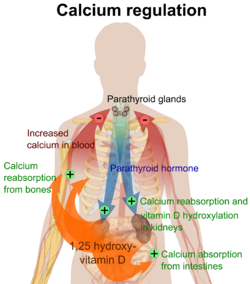Calcium is an important nutrient in physiological and biochemical processes of the organism and the cell. Calcium plays an important role as a secondary messenger in signal transduction for the contraction of the muscle cells and also in fertilization. Calcium ion also required by many enzymes and coagulation factor as a co-factor. The Calcium ion is also vital for maintaining a potential difference across the cell membrane. They are also necessary for bone formation, bone act as a major storage site for calcium. The Parathyroid gland’s hormone secretes a parathyroid hormone which reabsorbs calcium from bone. In mammalian cell calcium concentration is about 10-100mM and in blood plasma it is 2mM.
Food sources of calcium:
Milk is a major source of calcium ions. Besides that parmesan cheese, molasses, almonds, kale, sesame seeds, yogurt, spinach, hazelnut, etc. are also good sources of calcium.
Calcium level in blood:
Total calcium in blood plasma should range between 2.1-2.8 mmol/L. Total calcium is a measure of both protein-bound calcium and free calcium. Abnormally high level of calcium in blood plasma is known as hyperglycemia and low level is known as hypoglycemia.
Importance of calcium in animals:
- As we all know calcium ion is vital for so many physiological processes of our body for maintaining homeostasis. Its concentration should be maintained between the specific limit.
- Calcium is the most important element of bone and cartilage. In humans, total calcium is present mostly in the form of bone mineral around 99
- To make calcium available for exchange and different processes the process called bone resorption occurs in our body in which calcium gets liberated into bloodstream by the action of osteoclast cells.
- Levels of intracellular calcium are maintained by the transport proteins, which remove them from the cell.
- In neurons, voltage-dependent calcium channels are necessary for the synaptic transmission of neuron signal by the release of neurotransmitters into the synaptic cleft by the vesicle fusion of synaptic vesicles.
- Calcium binds with several calcium-modulated proteins such as calmodulin and troponin-C which are important for promoting muscle contraction.
- Calcium coordination plays an important role in the function and maintaining the structure of proteins.
- Calcium ion flow regulates the several secondary messenger systems of the body in neural adaption for the auditory, visual, and olfactory system.
- The Decrease in calcium ion concentration results in the condition called hypocalcemic tetany, which is characterized by the spontaneous discharge of motor neuron. Hypocalcemia also affects blood coagulation and signal transmission.
- Chronically increased level of plasma calcium is known as hypercalcemia and it is associated with cardiac arrhythmias and decreased neuromuscular excitability.

Importance of calcium in plants:
- Calcium ions guide the stomata closing in the plant cell. When guard cells get signal from abscisic acid, calcium ions enter the cytosol from both outside of the cell and from internal storage and reverse the concentration gradient so that potassium ions start exiting the cell which results into the closing of stomatal pores.
- Calcium ions are important for cellular division in plants. Calcium ions form mitotic spindle without which cellular division cannot occur.
- Calcium ions are vital components of cell membranes and cell walls in plant cells. Calcium is also needed to form pectin in the middle lamella of newly formed plant cells.
- Calcium ions also act as secondary messengers in plants for signal transduction as they do in animals.
- Calcium ions also stabilize the permeability of cell membranes.